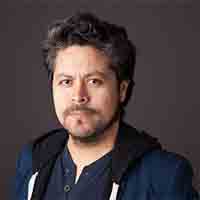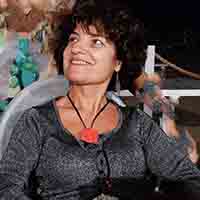IPA Webinars 2022
The External Reality in the Consultation Room
Research between psychoanalysis and neuroscience is historical. They have fascinated a large generation of psychoanalysts, from Sigmund Freud onward to understanding the relationships between external and internal reality, the general workings of the mind, and the role of the unconscious. In this webinar, three researchers will delve into some of the influences of what we commonly call external reality and its impact on mental life.
Presenters
 Tiziano Colibazzi (USA)
Tiziano Colibazzi (USA)
A native of Rome, Italy, Tiziano Colibazzi MD is an Associate Clinical Professor of Psychiatry at Columbia University as well as a Training and Supervising Analyst at the Columbia Center for Psychoanalytic Training and Research, where he serves as Research Co-Chair. After training in adult psychiatry, Dr Colibazzi completed a research fellowship focusing on longitudinal brain imaging in adolescents at clinical high risk for psychosis. More recently, Dr Colibazzi has focused on the field of personality disorders, applying automated natural language processing (NPL) methods to the study of primitive defence mechanisms such as splitting.
Title: Is Reality a Thing?
Reality is a confusing concept. Is my suffering real? Are my memories real? Are these problems real problems? Am I the real me on medications? Some and many other questions we routinely hear in clinical practice point to different meanings of reality. We explore how questions about reality must be reformulated to determine where and to what extent a neuropsychoanalytic perspective can be useful.
 Francisco Parada (Chile)
Francisco Parada (Chile)
Francisco Parada studied Psychology and Neuroscience in Chile. He moved to the USA to obtain his PhD in Cognitive Psychology and Neural Sciences at the Department of Psychological & Brain Sciences, Indiana University-Bloomington, IN. During this period, he focused his research on neural signal processing, brain networks, and embodiment within the context of social cognition. After his PhD, he continued his career as a postdoctoral fellow at the Department of Psychiatry at Harvard Medical School in Boston, MA. In 2016, returned to Chile as a professor of Psychology at Universidad Diego Portales and established the Center for Human Neuroscience & Neuropsychology (CENHN), multi-PI neuroscience of cognition research centre and day clinic for brain lesion survivors dedicated to the development of the transdisciplinary 4E cognition research program.
Title: Cognition and mental health in context: What is the role of environmental and sensorimotor structures?
The dynamics of the brain/body/environment system underlie the human experience, thus playing a constitutive role in our daily lives as well as in our well-being, health, and disease states. Ultimately shaping human societies. Determining how to appropriately measure, analyze, and interpret the brain/body system as it adapts to the ever-changing environments will significantly advance our understanding of how to build natural and virtual worlds individuals engage with daily and constitute meaningful interaction possibilities that give way to states of wellbeing, health, and disease. I will consider two lines of evidence suggesting that understanding the brain/body/environment system is impossible through a single disciplinary lens. First, recent studies under the fascinating -but still fledging Mobile Brain/Body Imaging approach- promises new insights into brain/body dynamics during interactions with real and virtual environments. Second, equally fascinating rodent studies suggest that an individual’s microbiome (the trillions of bacteria, viruses and fungi that inhabit and within living beings) can influence health states and even social behaviour.
 Rosa Spagnolo (Italy)
Rosa Spagnolo (Italy)
MD is a Neuropsychiatrist for Children, Child and Adolescent Psychotherapist, Psychoanalyst, and Full Member of the Italian Psychoanalytical Society (SPI/IPA). She currently lives and works in Rome. She is the co-founder and co-chair of the Italian Psychoanalytic Dialogues Association and the organizer of the annual IPD/NPSA Rome conference. She is a member of NPSA (The Neuropsychoanalysis Association), and she leads the NPSA Italian Group. She is the author of numerous publications as well as a conference speaker and lecturer on neuropsychiatric developmental disorders and psychoanalytical topics.
Title: “The external reality from within: blurred boundaries.”
Knowing how external reality is internalized, starting from one's own subjectivity, and gradually becoming external, is the current challenge of neuroscience and cognitive sciences. In a continuous external/internal reference with very blurred boundaries, the construction of external reality, perceived through the lens of internal reality, forces us to assume that both the outer and the inner world are part of psychic reality. We will describe some models concerning the encoding/decoding of external reality that help us navigate between neuroscience and psychoanalysis.
Moderator:
Mariano Ruperthuz H
Is a Psychoanalyst (Sociedad Chilena Psicoanálisis-ICHPA and member of the Buenos Aires Psychoanalytic Association (APdeBA) and historian. He has a Doctorate in Psychology (University of Chile) and a Doctorate in History (University of Santiago de Chile). He is an Academic and Researcher at the Andrés Bello University, Chile and visiting Researcher of the Program of Post-Graduação em História das Ciências e da Saúde da Casa de Oswaldo Cruz” (COC- Fiocruz, Rio de Janeiro). He is author of the book Freud y los chilenos (Pólvora, 2016) and co-author with Mariano Ben Plotkin of Estimado Dr. Freud. Una historia cultural del psicoanálisis en América Latina (Edhasa, 2017).